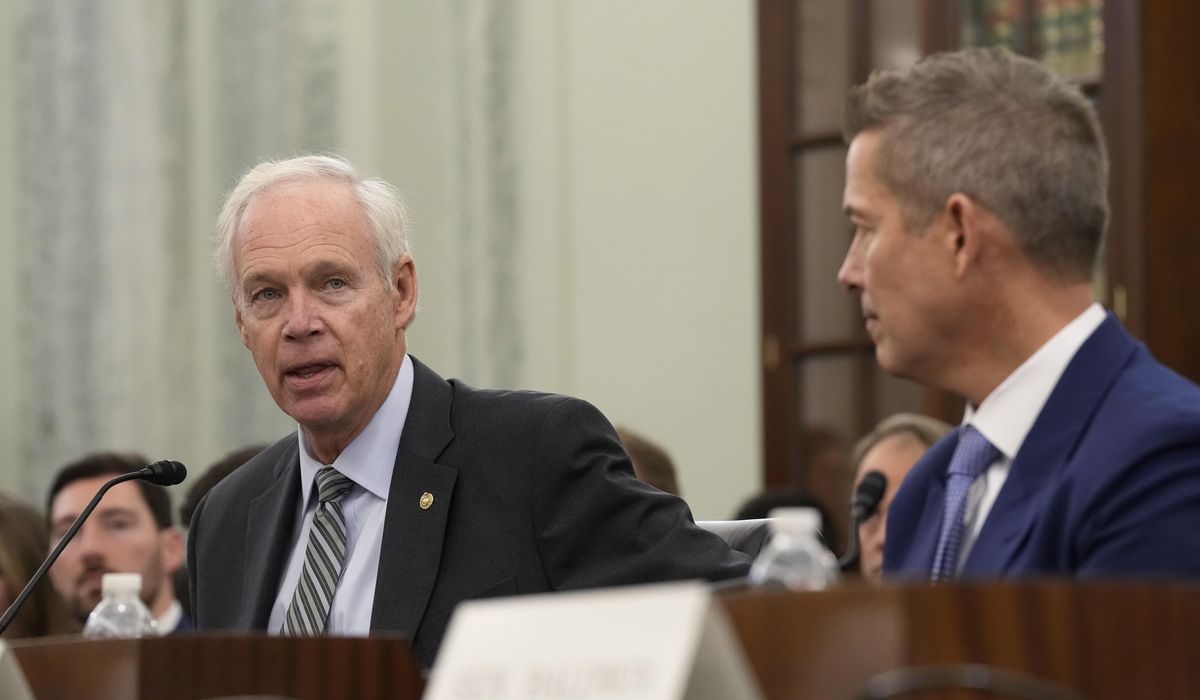


A group of Senate Republicans, led by fiscal stalwart Ron Johnson of Wisconsin, are prepared to torpedo President Trump’s signature tax cut bill without more cuts to federal spending, which has skyrocketed since the onset of the COVID-19 pandemic.
Mr. Johnson said he has gathered enough support from fellow Senate spending hawks to sink the “big, beautiful bill” that the Republican-led House triumphantly passed and sent to the Senate last week.
Unless more cuts are made, “it’s not going to pass,” Mr. Johnson told The Washington Times. “That’s my evaluation. I won’t vote for it.”
Mr. Johnson is among a handful of Republicans who say the House reductions of more than $1.5 trillion are insufficient to reduce federal spending.
Republican lawmakers also oppose the $3.8 trillion that the legislation is projected to add to the nation’s soaring deficit in the next decade and are unhappy with a provision that would raise the nation’s borrowing limit by $4 trillion.
Collectively, the spending cuts exceeded the House’s $1.5 trillion floor for savings over the next decade.
SEE ALSO: Republicans’ ‘big beautiful bill’ would cement Trump’s executive orders in federal law
However, the cost of the tax cuts, coupled with new spending, surpasses those savings, resulting in higher deficits, especially in the first few years.
Sens. Mike Lee of Utah, Rand Paul of Kentucky and Rick Scott of Florida are also among the Republicans who want the bill to tackle fiscal bloat further.
Mr. Lee told “The Charlie Kirk Show” on Wednesday that he would oppose the measure unless it reduces spending to pre-pandemic levels.
“In fact, there is no chance it can pass the Senate right now,” Mr. Lee said. “The big, beautiful bill is big. It isn’t as beautiful as it needs to be. But there is still time to fix it.”
A small number of Senate Republicans could block the legislation. Republicans control 53 votes and need 51 to pass the bill. The holdouts threaten to push negotiations past the Republicans’ goal of sending the measure to Mr. Trump by July Fourth. The changes in the Senate must be reconsidered and passed in the House, which could be tough.
Mr. Lee has proposed further savings by eliminating the provision for up to $40,000 in state and local tax deductions from federal income taxes. House Republicans added the deduction to the bill to win over moderates from high-tax states led by Democrats.
In a social media post, Mr. Trump urged lawmakers to get the bill to his desk “AS SOON AS POSSIBLE!”
Mr. Johnson and others, however, view the legislation as the last major opportunity to rein in spending that exploded after the spread of COVID-19.
Congress approved and Presidents Trump and Biden signed $5.6 trillion in emergency and other spending related to COVID-19 in a single year, starting in March 2020 when the outbreak reached the U.S. and shuttered businesses and schools.
Federal spending never shrank after that. The federal government spent $3.9 trillion in 2017. The budget has grown by 40%, to nearly $6.8 trillion in 2024.
The nation’s debt exploded from roughly $20 trillion in 2017 to more than $36 trillion. The deficit rose to $1.8 trillion, nearly tripling from 2017.
On May 15, Moody’s downgraded the U.S. credit rating, citing increased government debt and concerns that the government would not be able to meet its debt obligations.
Like Mr. Lee, Mr. Johnson is determined to force lawmakers to reduce spending to pre-pandemic levels. He said the House bill’s $1.5 trillion in savings is a pittance.
“Obviously, when they’re talking about being satisfied with $1.5 trillion over 10 years, that’s shaving $150 billion off whatever we’re going to spend this year,” Mr. Johnson told The Times. “And I don’t know what that is. I think it’s going to be over 7 trillion, but nobody really knows.”
Mr. Scott said he wants to support the Trump agenda but added that Congress must address the nation’s nearly $2 trillion deficit.
“I’m working hard to make this bill better when it comes to the Senate, and we will deliver on President Trump’s promises to the American people,” he said.
The House passed the legislation on May 22 in a narrow party-line vote.
The measure contains sweeping tax and spending cuts, border security and national defense funding, and policy changes designed to spur American energy production.
Mr. Johnson and other Senate Republican holdouts are under intense pressure to support the bill. It would permanently extend Mr. Trump’s 2017 tax cuts, which, if allowed to expire in January, would lead to one of the largest tax increases in U.S. history.
The White House Council of Economic Advisers projects that the tax cuts would generate 3% economic growth, leading to $4 trillion in additional revenue that would pay for the deficit spending.
Mr. Paul said he would consider voting for the measure if Republican leaders scrap plans to raise the nation’s borrowing limit. The limit must be raised by August to prevent the federal government from defaulting on its obligations.
“I still would support the bill even with wimp and anemic cuts if they weren’t going to explode the deficit,” Mr. Paul said on “Fox News Sunday.” “The problem is the math doesn’t add up.”
• Susan Ferrechio can be reached at sferrechio@washingtontimes.com.
